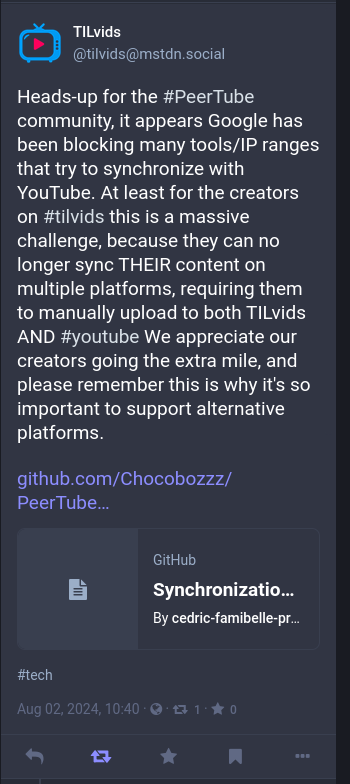this post was submitted on 17 Sep 2024
920 points (99.6% liked)
Technology
59358 readers
6604 users here now
This is a most excellent place for technology news and articles.
Our Rules
- Follow the lemmy.world rules.
- Only tech related content.
- Be excellent to each another!
- Mod approved content bots can post up to 10 articles per day.
- Threads asking for personal tech support may be deleted.
- Politics threads may be removed.
- No memes allowed as posts, OK to post as comments.
- Only approved bots from the list below, to ask if your bot can be added please contact us.
- Check for duplicates before posting, duplicates may be removed
Approved Bots
founded 1 year ago
MODERATORS
you are viewing a single comment's thread
view the rest of the comments
view the rest of the comments

I've seen the effects on invidious these past days. 8 in 10 instances have been broken. Google is putting some serious work into shutting alternate frontends down. Shows you how much of a dent they're putting in the bottom line.
Or how desperate google execs are to get even the tiniest bump in revenue.
LINE MUST GO UP AT ALL TIMES
Invidious and YouTube piped (and LibreTube) by default load the videos server-side, as opposed to GrayJay, NewPipe or Smarttube.
It has advantages (mostly that your IP address is not shared with YouTube, and it allows users from countries where YouTube is blocked to still access it) and inconvenients (much harder to keep up when YouTube actively seeks to block them).
Invidious shares your IP with google, it does not act as a proxy
I guess this reply lost its “by default” part on the way 🤔
I'm pretty confident that you are wrong.
https://docs.invidious.io/faq/#q-what-data-is-shared-with-youtube
Fair enough, that's interesting. I assume this only applies to the non-web clients. On the web, it would not be possible. You can verify by looking at the outgoing network requests on this random video for example: https://invidious.privacyredirect.com/watch?v=qKMcKQCQxxI
Why not?
Because of the CORS settings on Google's servers would tell your browser to not go forward with the request. There are two ways it could eventually be possible:
I haven't checked the CORS headers for YouTube videos but wouldn't access have to be fairly open to allow embedded videos to work?
For that they use iframes, which have a different security system.
https://github.com/iv-org/invidious/issues/4734#issuecomment-2349782180github.com/iv-org/invidious/issues/4734#issuecomment-2349782180
hopefully they come up with a workaround.
I doubt it's denting the bottom* line as much as the recent court rulings. And I doubt it's as much paying bills as it is paying vested interests.
I remember Hooktube. That was when front ends were still trying to play nice by accessing youtube the "right way".
They killed that one off pretty hastily.
Invidious was the hero successor, but I think we all knew that it would eventually come to this. Invidious' most recent fixes for blocking involve passing identity tokens, making a concession that Google is then better able to track users behind Invidious.
I'm not sure how much farther there is left to go on the technical angle of this fight.